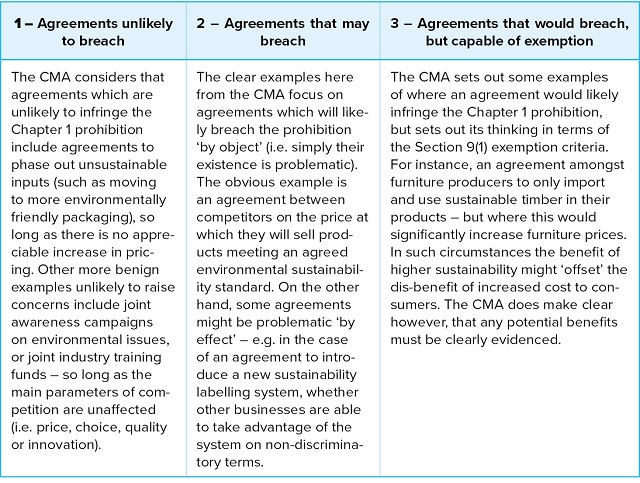In this article our regulation and markets team reflect on the Competition and Markets Authority's new draft guidance on sustainability agreements, and what this means for industry looking to collaborate to secure environmental benefit without breaching competition law.
The Competition and Markets Authority (the UK's competition regulator) is continuing its strategic focus on sustainability and net zero with the launch of a long-awaited consultation on guidance for businesses working with their competitors in support of sustainability objectives. The CMA is keen to demonstrate that competition law shouldn't get in the way of beneficial cooperation between competitors, where the effects of that cooperation may have benefits for environmental sustainability or contributes to the UK's net zero ambitions. For instance, competitors may want to work together on R&D activities to develop new, low carbon technologies, but might be reluctant to do so due to potential competition law enforcement concerns.
UK competition law prohibits anti-competitive agreements, such as price fixing agreements, between competitors. Businesses are rightly cautious about engaging in collaborative activities with their competitors due to this legal risk.
The CMA's new draft guidance is designed to provide businesses with some more certainty on when the CMA will and won't take enforcement action in relation to such agreements to collaborate.
No formal change to the law
It is important to remember that the proposals don't actually change the substantive law on anti-competitive agreements under Chapter 1 of the Competition Act 1998, which already contains an exemption from the Chapter 1 prohibition where certain criteria are met, under Section 9(1).
It also doesn't change the existing principle that it is for businesses to 'self-assess' compliance with any claimed exemption from the Competition Act, and that the CMA will not formally approve any arrangements notified to it, consistent with the CMA's current practice. In fact, the CMA's hands are somewhat tied on its ability to grant formal exemptions, since the repeal of Section 4 of the Competition Act (which permitted individual exemptions) in 2004.
As a result, there is no substitute for businesses undertaking their own rigorous legal due diligence for any proposals. That being said, the CMA is now clearly signalling a more 'open door' approach to engaging the business community on sustainability agreements, which is a helpful step forward compared to the previously 'closed door'. It provides significantly more insight on how the CMA will view such agreements.
The Framework
The guidance sets out a helpful framework, together with numerous examples, of how the CMA would likely view agreements across three categories: (1) Agreements which are unlikely to infringe the prohibition; (2) Agreements which could infringe the prohibition; (3) Agreements which would infringe the prohibition, but are capable of exemption under Section 9(1) of the Competition Act. Some examples, taken from the CMA guidance, include the following:

PDF available here.
Going further for Net Zero
The scope is squarely on what the CMA defines as environmental sustainability agreements, but it is willing to be even more permissive in its approach to assessing agreements that are directly related to the UK's binding climate change targets - what the CMA defines as climate change agreements.
More clarity for business - but what are the limitations?
The most interesting aspect of this new guidance is probably the overall shift in the CMA's approach to engaging on individual proposals. Until now, the CMA has generally discouraged businesses from approaching it directly regarding proposed agreements and proposals under the exemption criteria. Previously, the Office of Fair Trading (the CMA's predecessor), operated a process of 'negative clearance' or 'individual exemption'. However, this has not been available since 2004, and so assessment under Section 9(1) has been (and still is) a matter of self-assessment for the parties involved.
With this new 'doors open' policy, the CMA is now encouraging companies to get in touch to discuss their proposals. There is also the opportunity, after an informal assessment, for the CMA to give comfort to businesses indicating it doesn't think competition law is engaged or that the conditions for exemption are met. Crucially, the CMA won't issue fines against parties that implement an agreement which was discussed with the CMA in advance, and where it did not raise any competition concerns. It has even set up a taskforce and central email address to implement this process of engagement. In this sense, it's a little bit 'back to the future' for the CMA's policy in this area, even if formal individual exemption isn't back on the table.
However, it remains to be seen how far the CMA is willing to go in terms of the overall 'comfort' it will give to businesses, and how much of a catalyst this will be in unlocking beneficial activity that might not otherwise have gone ahead.
Certainly, the introduction of this new policy won't replace the need for businesses to undertake rigorous legal and economic assessment - indeed, the CMA will be more likely to offer substantive comfort where businesses have really done their homework. It's also worth bearing in mind, that while the CMA may give 'comfort' as to its intentions around potential enforcement action, this wouldn't prevent disgruntled third parties from potentially raising private enforcement action through the Courts.
Some may also question whether the guidance goes far enough at this stage, and whether the CMA is making full use of the powers in the Competition Act. For instance, under Section 6, the CMA can recommend to the Secretary of State that a 'block exemption' order be made for sustainability agreements, which would provide additional safe harbour for businesses under the legislation. This would, of course, require the support of the Department for Business and Trade (DBT).
There is also the question as to whether there is a missed opportunity to provide further certainty and clarity to businesses through the amendment of primary legislation, although this is more of a question for DBT rather than the CMA itself. For instance, should the Competition Act be amended to specifically mention sustainability and environmental criteria in the Section 9(1) tests?
Next steps
The consultation on the draft guidance is open until 11 April 2023, and the CMA is running a series of engagements throughout March. You can view the consultation on the CMA's website here. After this, the CMA will finalise and operationalise the guidance.
The content of this article is intended to provide a general guide to the subject matter. Specialist advice should be sought about your specific circumstances.





